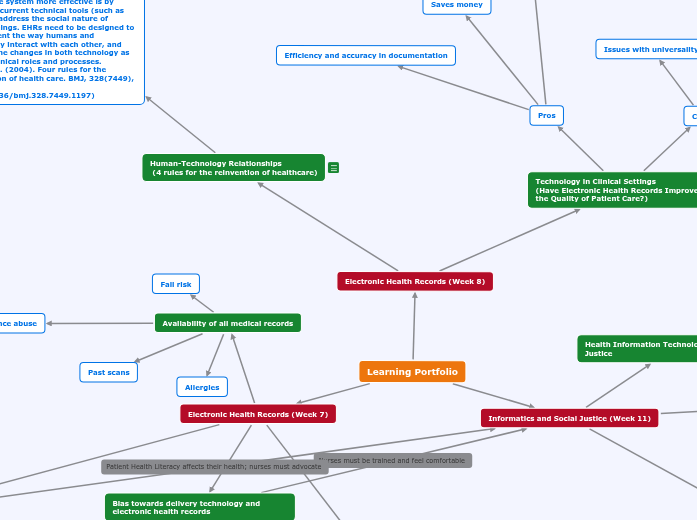Learning Portfolio
Electronic Health Records (Week 7)
Patient Access
Online Lab Services
Adverse Events
Documentation and Changing Information
Bias towards delivery technology and electronic health records
Consistency among all healthcare bodies, underlying language
Availability of all medical records
History of substance abuse
Past scans
Fall risk
Allergies
Informatics and Social Justice (Week 11)
Health Information Technology & Social Justice
Information Poverty/Digital Divide
Social Justice in Health Policy
Electronic Health Records (Week 8)
Human-Technology Relationships
(4 rules for the reinvention of healthcare)
Canada's health care system is under heavy strain; there is too little money and too few resources and workers to meet the demands of the Canadian population. The current system is not sustainable, changes need to be made.
An approach that can be taken to make the healthcare system more effective is by changing current technical tools (such as EHRs) to address the social nature of human beings. EHRs need to be designed to complement the way humans and technology interact with each other, and address the changes in both technology as well as clinical roles and processes.
(Coiera, E. (2004). Four rules for the reinvention of health care. BMJ, 328(7449), 1197–9.
doi:10.1136/bmj.328.7449.1197)
Technology in Clinical Settings
(Have Electronic Health Records Improved the Quality of Patient Care?)
Pros
Saves money
improved data retrieval
Efficiency and accuracy in documentation
Cons
Client feels disconnected from care, interferes with nurse-client relationship
Time Consuming
Leads to stigmatization/ bias
Issues with universality
Difficult for nurses that are not tech-savvy
